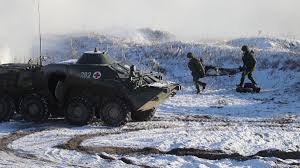Reading (UK). The possibility of a direct confrontation between Russia and NATO forces has increased as Russian troops approach the Ukraine-NATO border. On March 13, a Russian plane allegedly fired rockets at the Yavoryev International Peace and Security Center. This center is just 20 kilometers from the border of Ukraine and NATO country Poland.
Mistakes happen in all military organizations, this became more apparent in recent times, when an Indian missile accidentally landed in Pakistan after being launched. There is a situation of high tension between the nuclear-armed India and Pakistan right now. There was a lot of scope for revenge by Pakistan, but unlike Ukraine, there was no open war between the two countries, so as to confuse the situation.
If the same incident had happened in Ukraine between the Polish and Russian forces, it is unlikely that the Polish government would have convinced the missile launch was a mistake. Concerns about Russia’s intentions are at a higher level in NATO’s eastern countries than in the West. On March 15, the prime ministers of Poland, Slovenia and the Czech Republic risked a train ride into Ukraine to meet Ukrainian President Volodymyr Zelensky in Kyiv. The potential for confrontation increases when we assess each other’s troops on the ground.
Zelensky urges NATO to declare Ukraine a ‘no fly zone’
A mere firing on a calm and tense border or aggressive action by a junior non-commissioned officer mistaking a particular situation can lead to a fierce battle. Such fighting goes beyond the control of the local commanders. Zelensky has repeatedly called on NATO to declare Ukraine a “prohibited aviation zone”, but NATO leaders have concluded that it threatens a direct military confrontation between Russia and NATO forces.
Zelensky reminds America of Pearl Harbor and the 9/11 attacks
This appears to apply to Zelensky’s other requests, including a demand to supply aircraft to help the Ukrainian Air Force, but if NATO provides aircraft directly to Ukraine, Russia will take action to stop the supply of the planes. could. In this there can be attacks on airports where aircraft are kept. For example Poland before sending the plane to Ukraine. In his speech to the US Congress, Zelensky reminded America of the attacks of Pearl Harbor and 9/11. He warned of the consequences of NATO’s continued inaction.
What does NATO article 5 say?
NATO membership allows a member nation to invoke Article 5 of the North Atlantic Treaty to seek support from other members of the alliance. This article was used by the US for the first and last time in NATO history after the September 11, 2001 attacks on New York and Washington DC. But Article 5 does not guarantee that all other NATO states will send armed forces to deter an attack, with only military action being an option that can be included as part of the coalition’s principle of ‘collective defence’.
NATO expressed commitment to help Ukraine
UK Health Secretary Sajid Javid said during an interview on LBC a few days ago that, “If even a single Russian enters NATO territory, there will be war with NATO.” On February 25, the day after Russian forces invaded Ukraine, the heads of the NATO government met in Brussels. Condemning the invasion of Ukraine, he pledged to help Ukraine. NATO then deployed both land and maritime resources to its eastern regions.
NATO made preparations to deal with any untoward incident
NATO began to prepare itself by activating defense plans so that the alliance’s territory could be protected by responding to any contingency. My research on NATO includes informal discussions with several officials from various member states. This has led me to believe that some NATO countries may be reluctant to send their troops, even when Article 5 is used.
The question is whether the leaders of NATO countries would be willing to strike on Russian soil, which is crucial for the conflict. But if this happens, additional risks will increase and Russia may respond by deploying nuclear or chemical weapons. Conventional or nuclear deterrence – both situations require a rational assessment by both sides. As I have written earlier, Putin’s intellectualism is different from that of Western leaders, which is part of the reason for this war and crisis. So far NATO has not been successful in stopping Putin.
In contrast, Putin has threatened to apprise the coalition of results never seen before in history. Meanwhile, if Russia gets any exemption in peace talks, then the possibility of making more demands from its side increases. This concerns the Eastern European members of NATO. It is not yet clear whether NATO member states located far away from Russia feel the same threat.
 Indian Thought Latest News & Views
Indian Thought Latest News & Views



